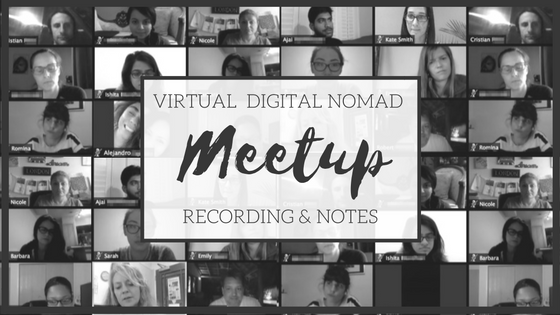Virtual Digital Nomad Meet Up: Recording & Notes
/Recently, I held the first ever virtual digital nomad meet up for exisiting and aspiring digital nomads (for me anyway) and it turned out to be a huge success! Here is a summary of how the meet up went, along with notes from our discussion.
What Attendees Thought About It
Here is what some of the participants had to say about it:
"I liked that it was small enough that everyone had a chance to speak!"
"I liked that it was a conversation. It was nice to be able to get together with like minded people and chat about something that we all are striving to achieve."
"I liked the fact that we could see and hear each other, so everyone was given the chance to say his/her opinion or ask a question. It's gives a sense of a group of people chatting around a table."
"Loved seeing people in different stages of their careers/remote journeys. Allowed for diverse perspectives and advice for specific goals by attendees!"
"Awesome bunch of people!!"
"The feeling of openness"
Video Recording of Meetup
Subtitles coming soon!
Summary Notes From The Meetup
Introductions (00:00 - 16:36)
Travel Programs/The Digital Nomad Lifestyle Pros and Cons (16:37 - 21:13)
Loneliness: Biggest obstacle as a digital nomad is loneliness. It can be hard to find people who relate to you.
Community: It’s important to find a digital nomad community. Travel programs are a great way to find your community - co-living, co-working, year long etc
>> Find a Digital Nomad Community
>> Travel the World and Work Remotely with These 10 Programs
Length of Stay: Remote Year takes care of logistics which saves you time, allowing more time for travel. If you do this on your own I suggest 3 months/location as 1 month at a time is really fast (since you’re working full-time at the same time).
Accommodation: Selecting accommodations are important because it becomes your home. You wouldn’t live in a hostel at home and go to work the next day, and the same hold true when you’re a digital nomad. With programs such as Remote Year, you don’t pick where you live and sometimes that means no kitchen, however, they seem to be moving to shared 2-3 bedroom apartments with a shared kitchen. You will always have your own bedroom. On your own, you do have the flexibility to live where you want.
It’s a lifestyle, NOT a trip
>> Get a $40 Airbnb Travel Credit
Digital Nomads Requiring Quiet Workspaces (21:14 - 21:50)
Shared bedrooms aren’t always a good option because you’ll need quiet spaces to work if you have calls
Co-working spaces are a great way to ensure you have good internet and a quiet space for calls, especially if you are just arriving in a country where you aren’t familiar with their internet quality and speeds.
>> Check out one of my favourite co-working spaces in Buenos Aires, Argentina - La Maquinita
Internet. Three ways to know if you’ll have a Fast and Reliable Internet (21:51 - 22:31)
Get a coworking space membership (a pretty safe bet when it comes to finding quality internet
Get a speed test of your accommodation before you arrive. Send the speed test link to the Airbnb or hotel and ask them to run it on their network and send you the results. Make sure they don’t take the test on the cellular data, and instead make sure it’s on the internet network that you will be using.
Just because a place says it has the internet doesn’t mean it’s necessarily good quality or reliable
Remote Year Internet Quality (22:32 - 23:04)
Remote Year seems to be using their 12 million dollar funding towards infrastructure what we understand means improving internet quality and coworking spaces
Length of Remote Year (digital nomad) travel program (23:05 - 24:47)
4-month programs seem to be easier for people to commit to
You learn different stuff at each interval (4 months, 6 months and 12 months)
By month 10 of Remote Year, I was exhausted and didn’t explore as much
It’s tiring traveling one month at a time because you are spending a weekend traveling to a new country, working full-time during the week, which essentially gives you 2-3 weekends to explore an entire country and then you’re off to the next country.
It’s a large balancing act - balancing your time between self-care, socializing, exploring, exercise etc - it’s really a balancing act
Remote Year’s offerings beyond just Travel and Accommodation (24:48 - 26:08)
Their main offer is providing accommodation, Internet, and travel between countries
They focus mostly on social events
Remote Year would value from focusing on professional development
Welcome Event
Farewell Party
Give back/ volunteer/ impact event each month
Networking event called the Junction where locals and Remote Year come together
>> Read: Remote Year: What to Expect of the Program
Professional Opportunities Abroad - Physically Working vs Working Online (26:09 - 27:48)
Remote Year and beyond, the networking provides many opportunities
Opportunity to collaborate with other digital nomads
Travel programs, co-working spaces, co-living spaces offers a great opportunity to connect with other digital nomads, not just travelers
>> Travel the World and Work Remotely with These 10 Programs
Break (27:49 - 28:01)
Visas (28:02 - 29:48)
As a digital nomad you require a travel visa (for the most part) because you are not physically working there (ie coffee shop), your clients aren’t there, and you’re not hiring locals of that country
Some countries require a tourist visa either before you land or upon arrival
In the ‘Schengen Zone’ (which includes 26 countries in Europe) you can enter for a period of three months within each six months period
Remote Year Itinerary Changes (29:49 - 30:24)
Remote Year will sometimes change locations, you’ll usually be given at least a month's notice if this happens
It’s important to be adaptable and open-minded with these situations
Visa Runs and Schengen Zone (30:25 - 31:21)
You can “hop borders” which means you leave the country you're staying in, go into a bordering country then come right back into the country you were originally in to reset visa limitations.
Taxes (31:22 - 32:40)
As a Canadian with a business registered in Canada, I pay Canadian taxes (as a digital nomad)
Estonia e-residency is popular among digital nomads
Many digital nomads will register their company in a different country with better corporate tax benefits such as Hong Kong
You only pay personal income tax on income paid to you, but you can get around this by writing many things off as a business expense
US Tax on Worldwide Income (32:41 - 33:54)
Your worldwide income is subject to U.S. income tax, regardless of where you reside, however, there is a tax break for Americans - Foreign Earned Income Exclusion (FEIE). The FEIE can exclude almost $100,000 of income earned in a foreign country plus you can exclude or deduct certain foreign housing amounts. You may also be entitled to exclude the value of meals and lodging provided to you by your employer. To qualify you have to be physically out of country for 330 days of the year.
Incorporating in Hong Kong (33:55 - 34:39)
Good place to incorporate, you will spend a couple thousand dollars a year with this option but it’s worth it in terms of the tax benefits and savings
Hong Kong is more legitimate than somewhere such as the Cayman Islands
Break (34:40 - 35:25)
Airbnb Internet and Deals (35:26 - 37:10)
Internet Tests: It will depend on the host if they will run a speed test on the internet network that you will be using but they should be willing to for the most part (I had a hotel do one for me no problem). Just make sure they run it on the network you will be using and not accidentally run a speed test using cell phone data
Getting a deal: Always chat with the host and see if you can get a deal
>> Get a $40 Airbnb Travel Credit
Figuring out if the digital nomad lifestyle is for you (37:11- 40:25)
Check out a co-working space in your country to get a feel for the type of people you will be surrounded by as a digital nomad since most digital nomads will work from those spaces (note: there is a difference between co-working spaces and shared working spaces so make sure it’s a co-working space. Co-working spaces have more of a community).
Take a month or two and go to a location and see how it goes for you before selling your stuff and fully committing
The best way to connect with a community when you arrive in a new location is to check out a co-living or co-working space because they will be full of digital nomads and will “take you under their wing” or you can join a digital nomad retreat
For your first location, just book accommodation for a week or so. Usually, once you are actually on the ground you will come across better locations for a cheaper price
What we’d look for in a Co-Living Space (40:26 - 43:54)
Arranging excursions (Cultural tours, Salsa classes)
Professional development
Volunteer opportunities
Creating a community of accountability of balance - work hard and play hard
Hostels (43:55 - 44:29)
Hostel can be an affordable way to meet people but they can be loud and you have to ensure your belongings are secure because you will have expensive stuff on you (laptop, camera etc)
Advice on Finding Remote Work, HR Regulations and HR Work Arounds (44:30 - 48:52)
You never know what opportunities are available within the position you are within now and might just need to be a conversation with your current employer. A lot of companies are “old school” and might have not even considered it but could be open to it. Put some thought into it and how it will benefit them. Perhaps try a few days a week working remotely and increase it from there. Don’t just reach out to them and say “hey, I want to work remotely because I want to travel”. How to not land a remote job.
>> Download the 'Remote Work Proposal' to help you prepare your pitch to your employer
If you find a company you really want to work for, check and see if they have remote opportunities
Consider start-ups, a lot of them operate online
Start freelancing - a lot of work is contract now so if you can start with a few clients and build from there.
>> Read: 'How to Calculate Your Freelance Rate' which comes with a free freelance rate calculator worksheet.
HR Regulations and a Workaround: HR is often not on board because they are responsible for you if anything were to happen to you but a good workaround is to technically become a contractor for a year then as a contractor they are technically not responsible for you but you can still maintain providing services to them
The Transition from Office to Remote (48:53 - 54:02)
Are you just trading a cubicle for sitting in a hostel?
You can work at multiple spots a day (ie. cafes to get work done or coworking spaces for professional networking)
When you freelance you can manage your time how you want. You work when and where you are most productive, whether that’s morning or night, at a cafe or coworking space. Whereas, as an employee,you may need to accommodate to working to a timezone
There can be advantages to different time zones meaning you may not be required to be available all hours of the day ie working in the morning while clients/your boss is awake then in the afternoon when they are offline (when they are asleep) you can do fun activities and what you want and then finish up your work later on
Working remotely, specifically as a freelancer it becomes more about productivity so you can do a 10-hour job in 2 hours and still make the same income (ie a developer can change the same for a site but do it in less time)
Read Tim Ferriss’s 4 Hour Work Week - it explains the process of talking to your boss and how to make that transition
The Advantage of Working Remotely (54:03 - 57:19)
Hardest part was figuring out when you’re most productive and what works for you
You can create your own schedule and can take advantage of timezones
Instead of working 9-5, you may work 9-7 but have longer breaks throughout the day
You don’t have to try and force yourself to work when you’re not productive
You can still be there should your team need you but you get to take those longer breaks
It’s not as though you’re trading working 9-5 at a cubicle to working 9-5 elsewhere - you can to work when you’re more productive and you have the flexibility
Robert’s team became 10X more productive once they switched from traditional to remote
Don’t be shy about asking your boss, “most forward-thinking bosses won’t have a problem with it.”
It becomes more about your output than office politics when you work remotely
Wrap of Meetup (57:20 - 59:05)
There will be more meetups on various digital nomad topics in the future - you can subscribe below to get notified when then next one is
Resources Mentioned
The Remote Work Proposal - to help you prepare your pitch to your employer
Follow the digital nomad journey
This blog contains affiliate links because running a blog ain't cheap. But all of products that I have listed are products I have or want. I would never recommend something to you that I don't believe in myself.





